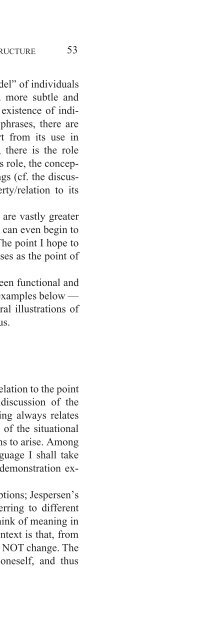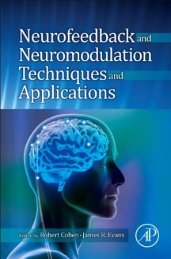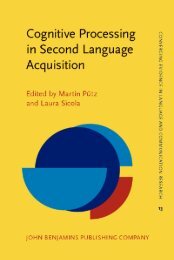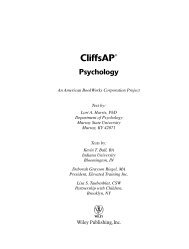Cognitive Semantics : Meaning and Cognition
Cognitive Semantics : Meaning and Cognition
Cognitive Semantics : Meaning and Cognition
Create successful ePaper yourself
Turn your PDF publications into a flip-book with our unique Google optimized e-Paper software.
116 ÅKE VIBERG<br />
Han slog ihop matsedeln och He closed the menu <strong>and</strong> wine list,<br />
vinlistan,<br />
When the object means ‘door’, slå preserves more of its basic meaning <strong>and</strong><br />
implies that the closing is more violent than normal. In particular, it invites the<br />
inference that the closing results in a loud noise, which is reflected in the<br />
translation equivalent slam:<br />
“När går ni av skiftet ikväll?” ”When do you get off your shift?”<br />
frågade han i samma ögonblick som he asked the one in the back as she<br />
en av dem slog igen bildörren. slammed the car door.<br />
When slå upp is combined with objects of the type ‘book’, the meaning can be<br />
extended further. It can refer to the turning of pages, <strong>and</strong> the object in this case<br />
refers to some section of a printed document:<br />
Hon slår genast upp Kvinnosidan, She turns at once to the Women’s page,<br />
The extension proceeds one step further when the object refers to the information<br />
that can be found in the document. A conventionalized expression such as<br />
slå upp ett ord ‘look up a word (in a dictionary)’ is based on metonymy. The<br />
following actual example illustrates the same meaning but contains the particle<br />
efter ‘after’ instead of upp:<br />
Han hade på försök slagit efter He had tried looking up The Biggest<br />
“Världens största mage” Stomach in the World<br />
Via these extensions, slå upp covers a large class of nouns in the uses related<br />
to the meaning ‘open’. The previous examples also show that a rather detailed<br />
representation of nouns including a great deal of ‘encyclopedic’ information is<br />
required for the comprehension process<br />
As already mentioned in 5.1, slå upp can also be used with the meaning<br />
‘pour’ when it appears in contexts with nouns referring to liquids <strong>and</strong> containers.<br />
However, in this use it is rather common that the crucial nouns do not<br />
appear in the same sentence but in the wider context. This is clearly an<br />
exception with slå, but the phenomenon is of great interest since it shows that<br />
it is necessary to extend the analysis beyond the scope of the individual<br />
sentence.<br />
Lindgren skrattar ett låtsasskratt Lindgren laughs an affected laugh<br />
och drar fram en flaska Kronvodka <strong>and</strong> produces a bottle of Crown vodka<br />
ur ryggsäcken.—Om du inte är snäll, from his rucksack. –If you’re not nice,<br />
så får du inte smaka, säger han och you won’t get any, he says <strong>and</strong> pours<br />
slår upp åt sig själv innan han låter some for himself before he lets the bottle















